Introduction
In understanding cultural shock, it is vital that one determines the actual meaning of the term. Basically, it is a unique familiarity that someone goes through in a different place when he/she changes residence.
Cultural shock affects the person psychologically, as an individual as well as a family, meaning that the practices of the people in the new environment might not conform to the person’s usual culture, thus creating a cultural dilemma for him/her or the entire family.
Therefore, the presentation gives detailed explanation of the research findings of understanding the stages of cultural shock. It also demonstrates the strategies that the learners could apply in creating a supportive learning environment.
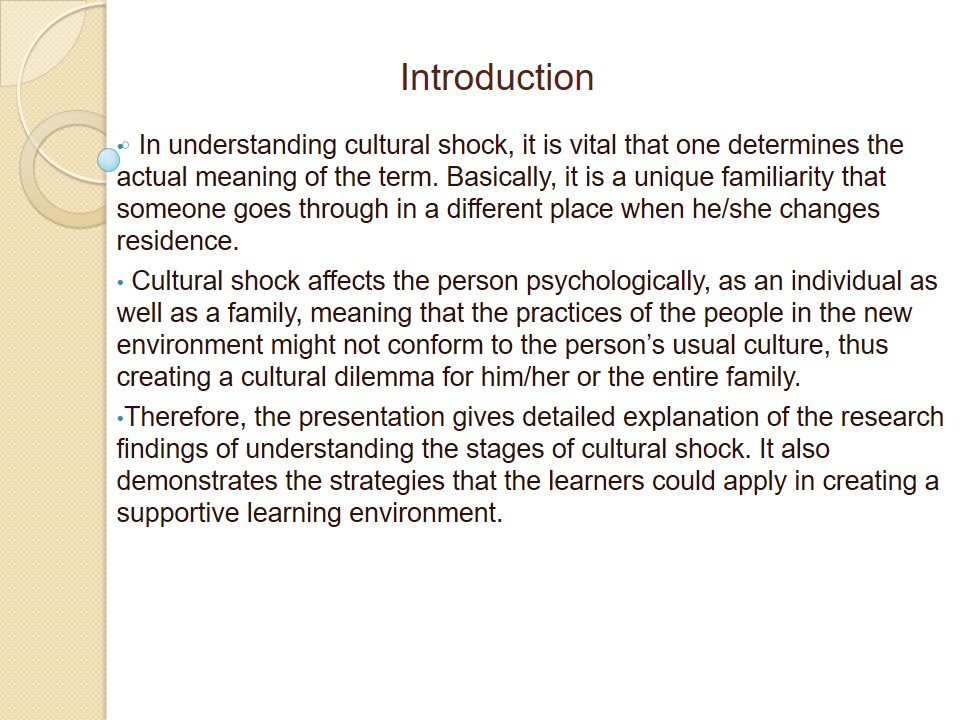
Causes of Cultural Shock
Often, cultural shock is caused when the person changes his/her usual environment and starts adapting to the new ways of life in the new place (Armin 14).
Migration is one major cause of cultural shock, and since people usually move from one environmental setting to another, in search for employment, good arable land, place for settlement, and good business place, they are likely to come across cultural practices that are dissimilar to the ones in the former residential place (Armin 14).
Cultures differ from place to place because it is a source of identity for the various people living in a particular area. When a person comes to this new environment and start interacting with such unique practices, he/she might be in for a great surprise.
Though it would take the person a longer time to adapt to a new culture, it is likely that the person might adopt the practices of the people in this new area due to influence resulting from increased interaction with the new practices (Armin 15).
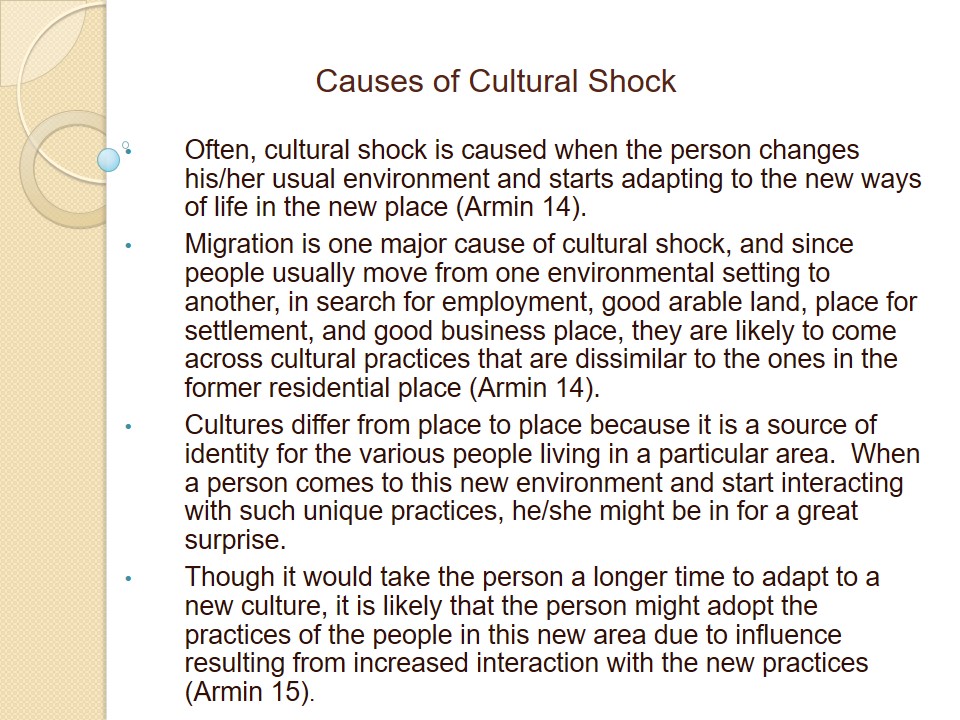
Rationale for Cultural Shock
- Cultures vary from place to place, and the new person has to accept the reality because the people in different environments have various practices, which may be unique.
- Therefore, they have to be ready for a deep shock about the people’s practices once they shift their residence. So they should harmonize the practices and minimize the impacts.
- In the first place, cultural shock is inevitable in the new environment, and might change the person’s behaviour.
- As a result, the behaviour will obviously shift to that of the dominant culture. In cases of migration, the dominant behaviour will be basically of the host culture.
- Notably, the impacts of cultural shock changes gradually as the person or family continue to interact with the new cultural practices, which proceed in stages (Kwintessential 1).
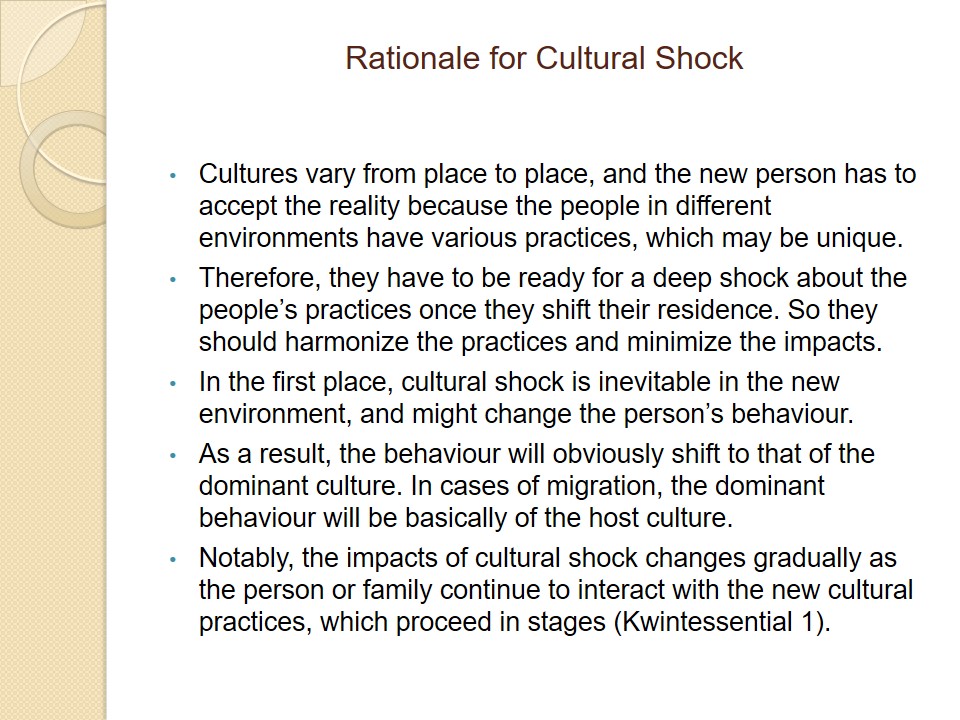
Stages of Cultural Shock
Understanding the stages of cultural shock are very important because they help the person absorbs and accepts the reality and variations of different lifestyles. This enables him/her coexist harmoniously with the people from other cultures (Kwintessential 1).
In this regard, there are four main stages of cultural shock, and are as discussed below.
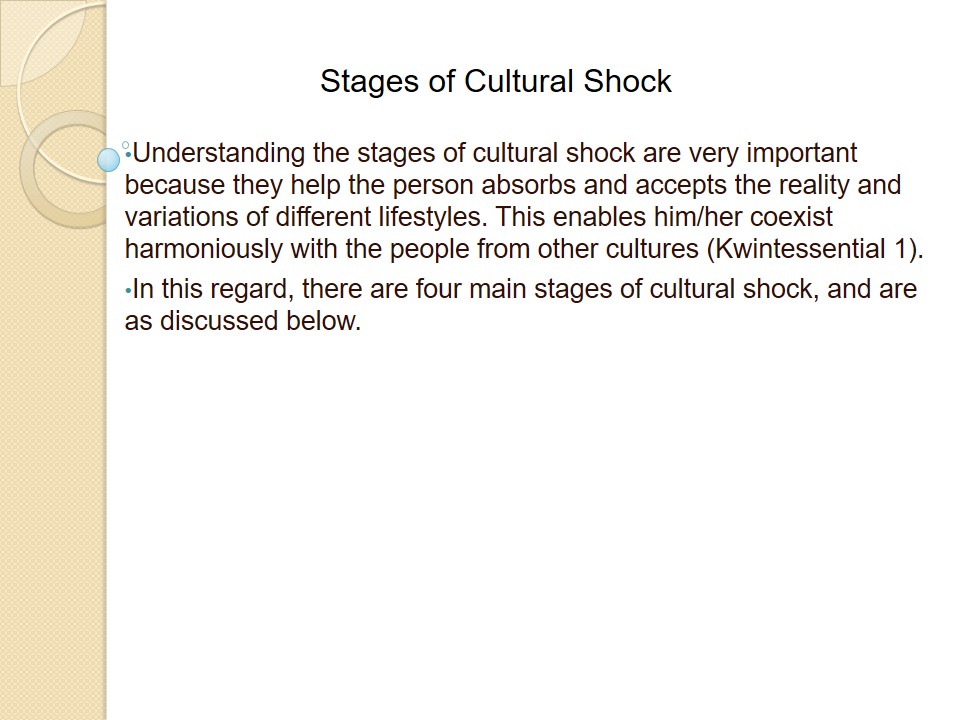
Excitement stage
The first stage is the excitement phase. This stage is important because it is when the person initially comes across the unique experience with the environment. It is like enjoying a “honeymoon” with the place’s distinct and fabulous cultural attributes (Kwintessential 1).
Experts agree that during this stage, the person displays a number of attitudes towards the new culture, including the following.
The person becomes very excited about the unique practices of the people in this environment, thus it depicts a source of entertainment.
Secondly, the impression about the new culture engulfs the person as he/she enjoys such cultural display (Kwintessential 1).
Since the culture is absolutely foreign to the person, it acts as a source of fascination, thus attractive to the new family.
The people do not get actively involved in participating in the new culture because they have limited knowledge of the practice and might not understand its significance, other than enjoying the attributes (Kwintessential 1).

Withdrawal Stage
This is the second stage of cultural shock, and the affect the new person considerably. Due to increased interaction with this culture, the person becomes knowledgeable with the practices .
This stage marks the discovery phase, where the person realizes the strange things about the culture. Some may be frustrating that the person begins to experience the actual shock (Kwintessential 1).
In addition, this stage is critical because the person discovers more issues about the culture. The person might find such behaviour peculiar and unbelievable (Kwintessential 1).
He/she might be in great shock because all the thrilling issues about the culture could be discovered to be unusual and really questionable.
The person may start hating some of the cultural attributes because a keen observation of the behaviour would affect the general rating of the culture, and the person could be very anxious (Kwintessential 1).
This creates withdrawal syndrome and leads to criticism of the practice and the people doing it. Moreover, it could lead to mockery and a disgrace to the community carry on this practice.
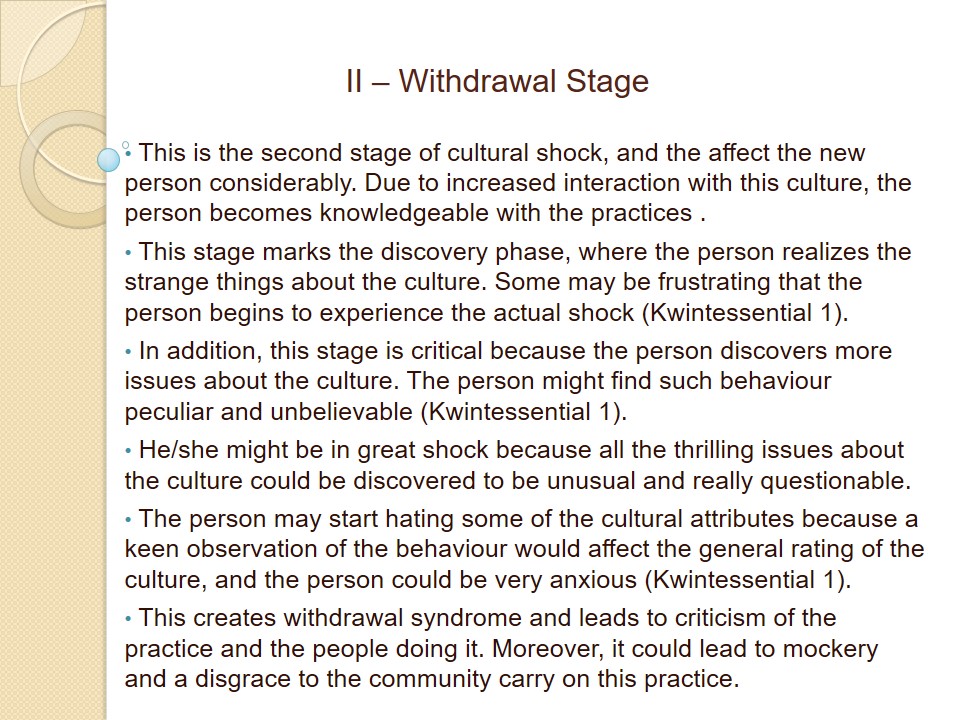
Adjustment Stage
This is the third stage of the cultural shock. It is as well important because as the person get used to the practice, he/she becomes settled and begins to appreciate diversity. He/she could also find ways of handling the impacts of the culture.
Circumstances may compel the person accept the people practicing this culture since that is their way of life and it is generally accepted in the community (Kwintessential 1).
In addition, the sense and feeling of segregation is drastically reduced. This would make him/her feel as part of this community and starts enjoying the practice once more (Kwintessential 1).
He/she regains morale and enthusiasm about the practice, and seems to be part of this cultural behaviour. At this point the person would not feel lost and disgusted about the culture (Kwintessential 1).
The person might as well renew his/her strength and desire to discover more about the practice and its significance to the community (Kwintessential 1).
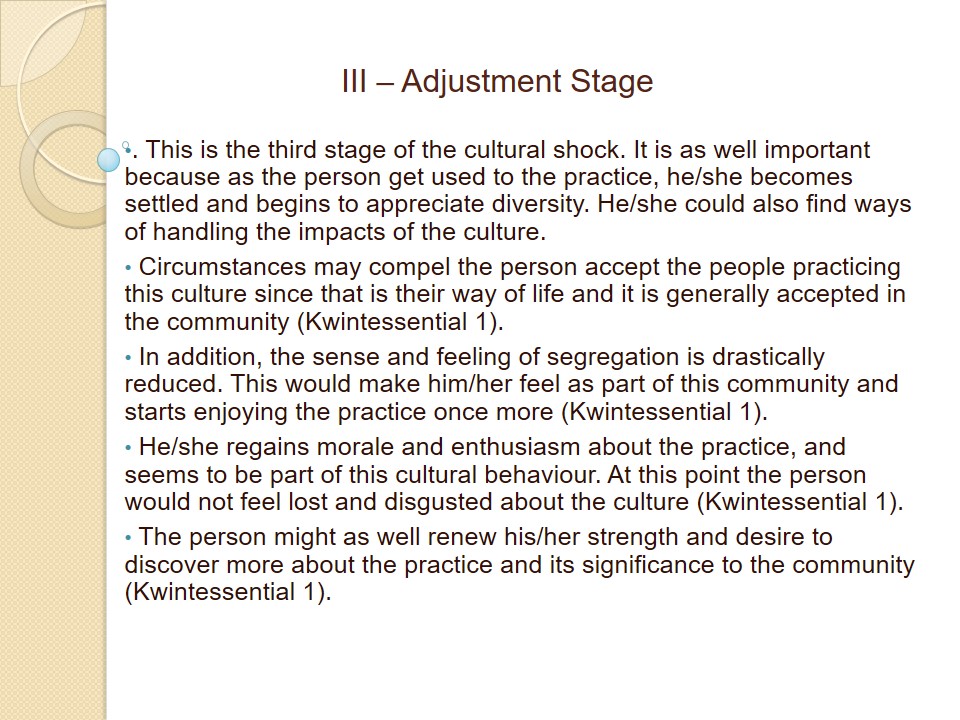
Enthusiasm Stage
This is the fourth and final stage of cultural shock. Similar to the other stages, it is very significant for the new person trying to adopt a new practice.
The initial attribute that the person displays at this stage is the affinity to this culture (Kwintessential 1). He/she begins to feel as being part of the culture because he/she understands the people’s custom and the significance of most of its practices.
He/she then becomes free to participate in the cultural functions and literally adopt the people’s behaviour (Kwintessential 1). This would enable the person to be the same as the original people of the place.
At this level, the person may drop part of his/her previous practice in favour of the new practices. This development of preference to the new practice is aimed at making sure that the person does not suffer from isolation in the new community (Kwintessential 1).
Though the person may not adopt all the practices of the people in this area, he/she might identify some important traits considered significant and accept them (Kwintessential 1). This increases his/her participation on the cultural functions of the community.
Finally, he/she becomes part of the cultural practices of the community on a full term basis.
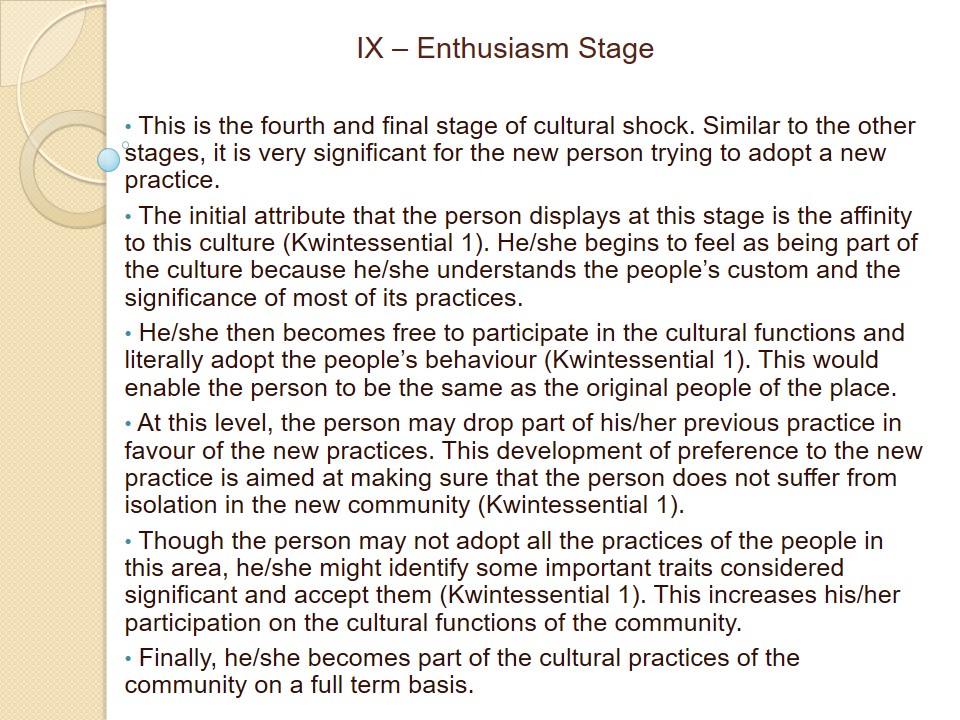
Consequences of Cultural Shock
Notably, cultural shock has a lot of consequences on the new person, some of them not pleasant for smooth survival.
First, it initially affects the relationship between the new person and the people living in the host community (Armin 43).
This is because once the person notices the peculiar behaviours; especially those which contradict his own, he may not be able to interact with the people freely, at least for the initial period.
Secondly, it might affect the business development in the area (Armin 44). In this regard, when an entrepreneur sets up a business in a new environment where the people display different cultural behaviour to his/hers, it might be a barrier to conducting the business if the cultural differences have not been harmonized (Armin 46).
Third, it might affect family and personal development of the mew person due to cultural differentiation (Armin 48).
This indicates that the cultural attributes, which differ should be harmonized immediately to reduce the impact on the new person or people.
However, such impacts could be minimized if the person adopts the new culture within the shortest possible time.
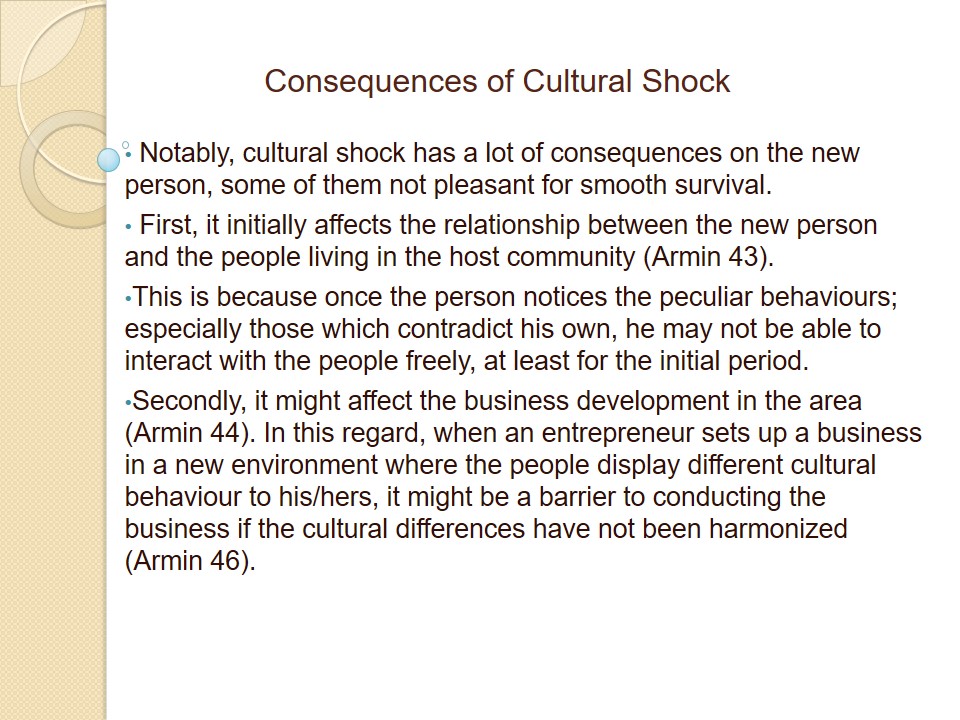
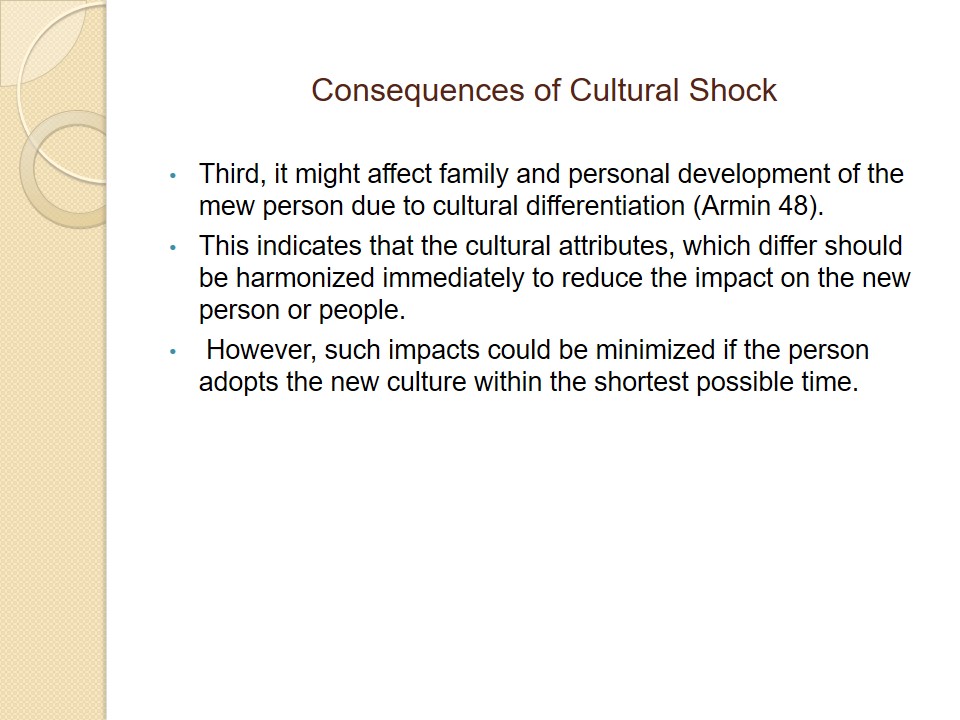
How to go about Cultural Shock
- Minimizing the cultural shock is one way of reducing its impact on the person, family or business growth. In this respect, the scholars agree on a number of issues that the person should address in order to reduce the impacts.
- Since it is unavoidable, the person should do all he could to go through the shock. The person must do a number of things, including the following.
- First, accepting that one is in a situation of cultural shock (Tabak 1). Under this acceptance, the person will recognize the feeling that cultural shock is unavoidable in the new environment. This will enable the person to get used to such practices and adopt the particular cultural attributes in the latter environment (Tabak 1).
- Second, it is significant for the new person to acquire some knowledge about the people’s language. This would make him/her gain deep understanding about the importance of the culture. Noting that a lot of cultural activities are performed using the native language, understanding the language is very significant in accepting the culture (Tabak 1).
- Through practicing such, the person can greatly reduce cultural shock. Moreover, this will make the person enjoy life in this new environment that he/she has become part of.
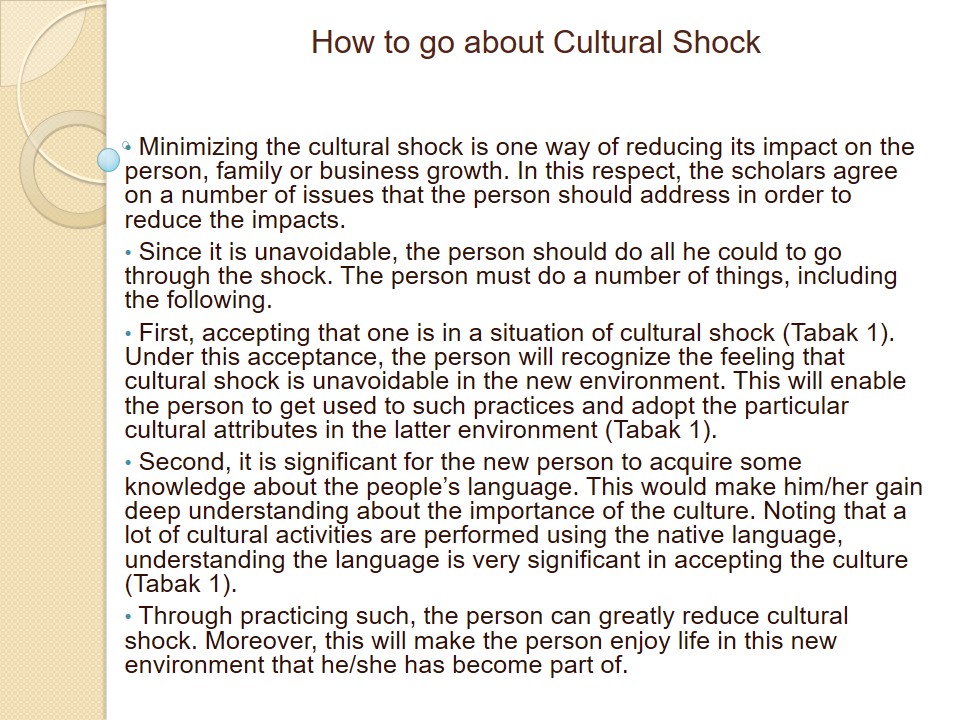
Conclusion
In summary, Cultural shock is a reality and affect many people, families and business, especially when there is a shift to another environment. From the discussion, it is evident that all the people who migrate to new locations suffer cultural shock so long as they have not adapted to the practices of the people living in the area.
As well, developing interest on the new practices, which one comes across, is very important because it helps the person appreciate the lifestyle of the others and adopt them since he/she would be part of this culture for a long time.
Finally, acknowledging the cultural diversity among different groups of people assists the people to go about the cultural shock, and continue to live normally in the new area.
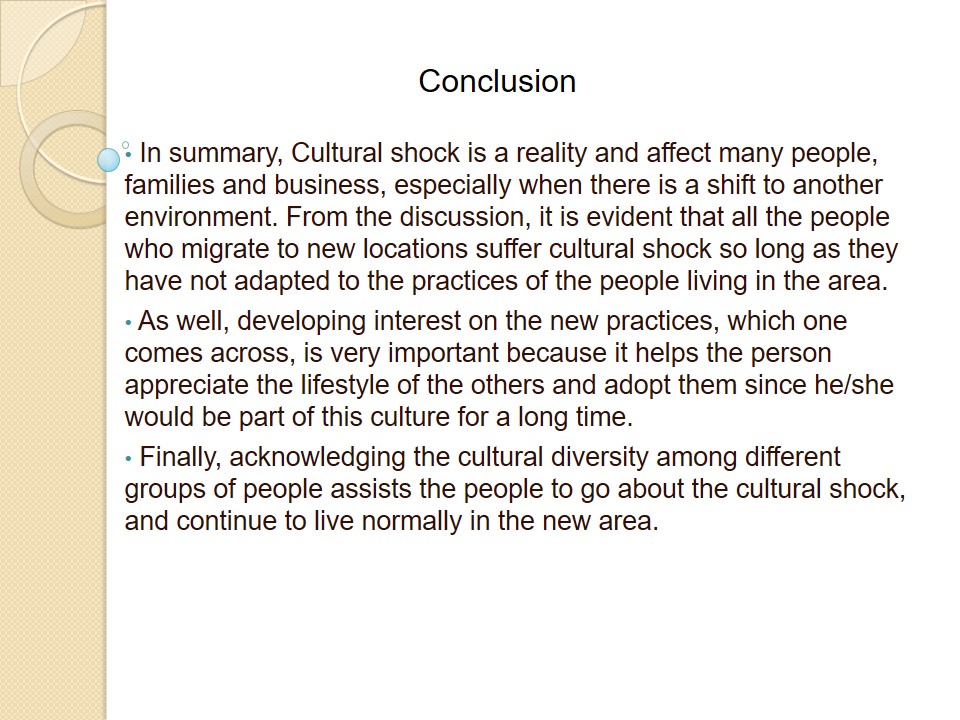
Works Cited
Armin, Skierlo. Avoiding Culture Shock- Exposure to Unfamiliar Cultural Environments and Its Effects on Exchange Students. Los Angeles: VDM Verlag Publishing, 2008. Print.
Kwintessential Ltd. The Stages of Cultural Shock 2010. Web.
Tabak, Ross. The 4 Stages of Culture Shock, And How To Beat Them 2007. Web.